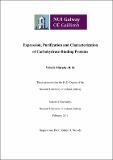| dc.contributor.advisor | Woods, Robert J | |
| dc.contributor.author | Murphy, Valerie | |
| dc.date.accessioned | 2014-08-08T12:47:40Z | |
| dc.date.issued | 2014-05-29 | |
| dc.identifier.uri | http://hdl.handle.net/10379/4479 | |
| dc.description.abstract | Glycans play important roles in many biological interactions. They are involved in cell-cell interactions, function as a point of entry for viral infections and facilitate the adhesion of microbes in the body. Glycans of interest may be normally present on cell surfaces or may be the result of a change in the normal glycosylation leading to different disease states. As a result these glycans make interesting targets for the development of diagnostic reagents. Antibodies, lectins and enzymes are three types of carbohydrate-binding proteins that recognise these cell surface glycans. We are interested in two different carbohydrate-binding protein systems. Firstly, single chain variable fragment antibodies based on murine monoclonal antibodies (mAbs), C3.1 (IgG3) and B6.1 (IgM), that are both specific for the same [beta]-1-2-mannotriose cell-wall epitope on Candida albicans and secondly an inactive [alpha]-L-fucosidase enzyme for the recognition of terminal fucose residues.
We engineered a recombinant single-chain variable fragment (scFv) Ab consisting of the variable heavy and light chains of the parent C3.1 IgG3 mAbs. Using site-directed mutagenesis (SDM) we generated B6.1 subclones that comprise the six unique amino acid point mutations between the two antibodies, the B6.1 scFv and a B6.1 mutant subclone. We report on the expression, purification and kinetic analysis of the C3.1 and B6.1 scFvs to date.
An [alpha]-L-fucosidase was engineered based on [alpha]-L-fucosidase from Thermotoga maritima that is the closest bacterial relative of mammalian [alpha]-L-fucosidases and shares 38% identity with human [alpha]-L-fucosidase. The nucleophilic activity of the enzyme was removed by SDM to introduce a point mutation D224N. We are interested in determining the affinity and specificity of the D224N [alpha]-L-fucosidase by glycan array screening and SPR. | en_US |
| dc.rights | Attribution-NonCommercial-NoDerivs 3.0 Ireland | |
| dc.rights.uri | https://creativecommons.org/licenses/by-nc-nd/3.0/ie/ | |
| dc.subject | Protein expression | en_US |
| dc.subject | Candida albicans | en_US |
| dc.subject | Single-chain variable fragments (scFVs) | en_US |
| dc.subject | Alpha-L-Fucosidase | en_US |
| dc.subject | Thermotoga maritima | en_US |
| dc.subject | Immobilised Metal Affinity Chromatography (IMAC) | en_US |
| dc.subject | Size Exclusion Chromatography (SEC) | en_US |
| dc.subject | Enzyme-linked Immunosorbent Assay (ELISA) | en_US |
| dc.subject | Surface Plasmon Resonance (SPR) | en_US |
| dc.subject | Affinity | en_US |
| dc.subject | Specificity | en_US |
| dc.subject | Department of Chemistry | en_US |
| dc.title | Expression, purification and characterization of carbohydrate-binding proteins | en_US |
| dc.type | Thesis | en_US |
| dc.contributor.funder | Science Foundation Ireland | en_US |
| dc.local.note | We have studied different carbohydrate-binding proteins to determine their specificity and affinity for specific glycans. Glycans present on microorganisms can act as a point of entry for infection or on normal human cells can be a sign on disease. This makes them potential targets for the development of diagnostic reagents. | en_US |
| dc.description.embargo | 2016-05-29 | |
| dc.local.final | Yes | en_US |
| nui.item.downloads | 1880 | |


